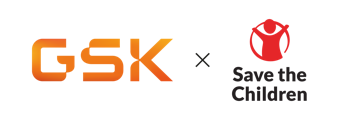Uniting for Child Health: Save the Children and GSK Support GAVI's Ambitious 6.0 Strategy
by Dan Paskins and Ariane McCabe. Published 11/10/2024
As long-standing partners in the fight for global child health, Save the Children and GSK are proud to lend our collective voice in support of Gavi, the Vaccine Alliance’s 6.0 strategy and investment case. Our award-winning partnership has demonstrated the power of collaboration between the non-profit and private sectors, and we believe Gavi's strategy will be transformative in protecting millions of children worldwide.
The Gavi 6.0 strategy, covering the period 2026-2030, builds on past successes while setting ambitious new goals to improve vaccine access and strengthen health systems globally. GSK is also a long-standing supplier of vaccines to Gavi having supplied about 1.2 billion doses since 2010. As organizations deeply committed to child survival and equitable access to innovations, we see immense potential in this forward-thinking plan.
Key aspects of the strategy that resonate with our shared mission include:
1. Expanding vaccine coverage to reach zero-dose and under-immunized children: This has informed phase 3 of our partnership to focus on zero dose children in Nigeria and Ethiopia. The 'zero dose' concept refers to children who have never received any routine vaccinations. The continent has the highest number of zero dose children in the world: 8.7 million children. More than a third of these children live in Nigeria and Ethiopia, where the combined impacts of the pandemic, poverty, climate change, instability and conflict are disrupting vaccination campaigns. Using GSK and Save the Children’s combined expertise and 10 years of experience working together, alongside numerous national and international partners, we will develop, pilot and implement tailored approaches to reach zero dose children in diverse settings.
2. Strengthening primary health care systems in lower-income countries: We aim to contribute to improving the quality of vaccination services, making sure they can keep running even in time of crisis – whether that’s training local health workers, or providing solar refrigerators to keep vaccines cold on their journey.
3. Leveraging innovative technologies; Save the Children’s Immunisation Accelerator, with funding from GSK, is investing $1 million in local innovators to drive progress on zero-dose and under-immunised children in both countries. The Immunisation Accelerator will fund and support community-based innovators to develop robust context-specific evidence for solutions that address long-standing barriers to child-immunisation.
4. Optimising how we use evidence to inform decision making: Our immunisation programmes and policy work are driven by quality evidence generated through collaboration with international and local research partners.
5. Promoting vaccine equity and addressing systemic barriers in immunization: we are working to make sure vaccination services are more inclusive and can be accessed by all children – using data to track which communities might be missing out on vaccines and helping to reduce the time families spend travelling to access their children’s vaccines.
Our partnership has long focused on training health workers, strengthening supply chains, and supporting community engagement around vaccination to ensure that vaccines get to the right people. These elements align closely with Gavi's holistic approach to creating sustainable, resilient health systems.
The investment case accompanying the Gavi 6.0 strategy outlines the resources needed to turn this vision into reality. We urge the global community - governments, private sector entities, and civil society organizations - to rally behind this crucial funding effort. The return on investment in child health and immunization is immeasurable, not only in lives saved but in stronger economies and more stable societies.
As we've seen through our own collaboration, combining the reach and expertise of a global NGO with the R&D and product supply capabilities and resources of a pharmaceutical company can yield powerful results. We believe this same spirit of partnership, embodied in Gavi's public-private partnership model, is key to achieving the ambitious goals set forth in the Gavi 6.0 strategy. The Gavi multi-stakeholder model and power of the collective Alliance members embodies the very essence of ‘partnership for the goals’ as the means to achieve the Sustainable Development Goals (SDG’s) by 2030.
A fully funded Gavi 6.0 will allow the immunisation of 500m more children between 2026-2030, potentially saving an additional 8-9m lives. In addition to the lives saved, by 2030, the Gavi Alliance is projected to generate at least $100 billion in economic benefits for Gavi supported implementing countries.
Together, Save the Children and GSK pledge our continued support to Gavi and its mission. We call on our peers and partners across sectors to join us in backing this vital organisation. By uniting behind Gavi 6.0, we can move closer to a world where every child, regardless of where they are born, has the chance to survive and thrive.
By
Dan Paskins - Interim Executive Director of Policy, Advocacy and Campaigns. Save the Children
Ariane McCabe - Lead, Global Health Policy & Advocacy. GSK

